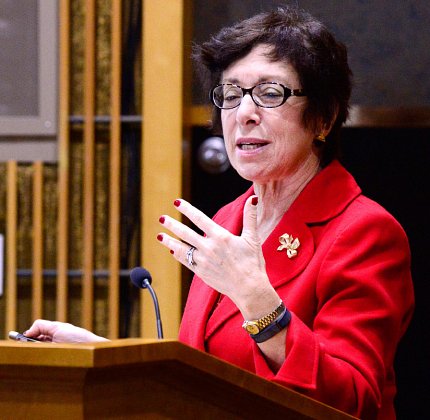NIEHS Science Informs Response to Flint Water Crisis

Photo: Steve McCaw
NIEHS and National Toxicology Program director Dr. Linda Birnbaum recently addressed NIH’s institute and center directors about the environmental emergency in Flint, Mich.
She presented background data on lead and current plans for addressing the problem of contaminated drinking water in Flint, a city with a declining population and a high rate of poverty that is now under federal and state emergency declarations because of its lead-contaminated water.
In January, President Obama issued an emergency declaration to help the 30,000 water subscribers in the affected area. The action includes immediate funding for distribution of bottled drinking water, filters for home faucets and water testing kits. HHS, under the stewardship of Dr. Nicole Lurie, assistant secretary for preparedness and response, is in charge of the federal response in Flint.
She called on NIEHS to provide scientific leadership and coordination of the research efforts focused on the Flint situation. The institute has a long history of research on the health effects of lead and of responses to disasters such as the Gulf oil spill, Superstorm Sandy and the Ebola outbreak.
Once the humanitarian aid, immediate medical interventions and infrastructure improvements are completed, Birnbaum envisions an ongoing role in Flint for federal agencies, including NIEHS and its grantees. “Educational and nutritional enrichment may have a positive impact on children with elevated blood lead,” she explained. “[There are] opportunities for longitudinal research on various issues.”
In addition, health and safety training for workers involved in removing and repairing damaged pipes, supported by the NIEHS Worker Training Program, will likely be important for the coming months, if not years.
Multiple federal agencies are involved and physicians and mental health professionals are already on the front lines. The Federal Emergency Management Agency and the State of Michigan are providing drinking water to residents.
The NIEHS response includes reviewing new proposals for time-sensitive and researcher-initiated grants and working with current NIEHS grantees at the University of Michigan, Michigan State University and Wayne State University, who are using their resources and community connections to address community concerns.
“We are committed to helping the people of Flint recover from this crisis, and already we are making substantial progress in supporting the state’s top priorities,” Lurie said.—Eddy Ball
